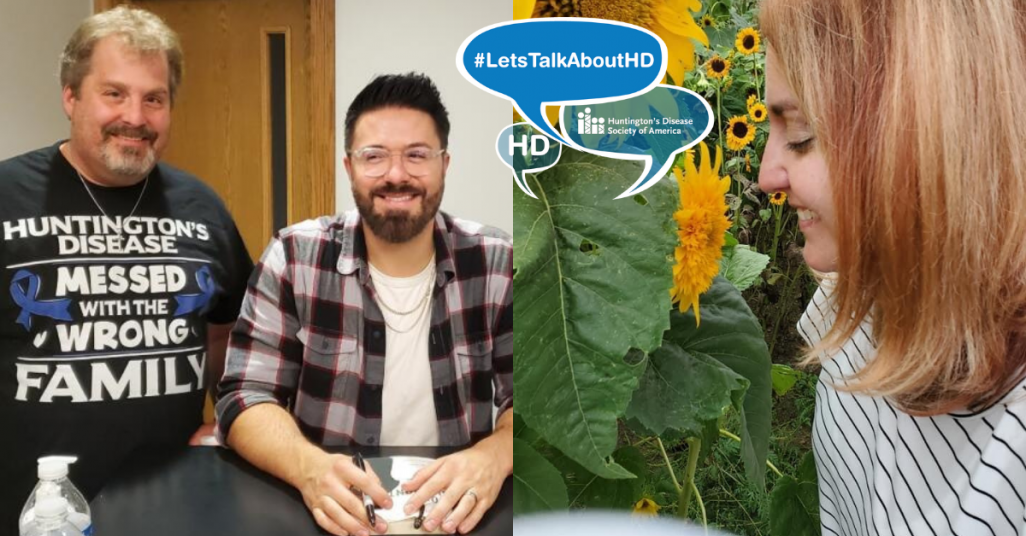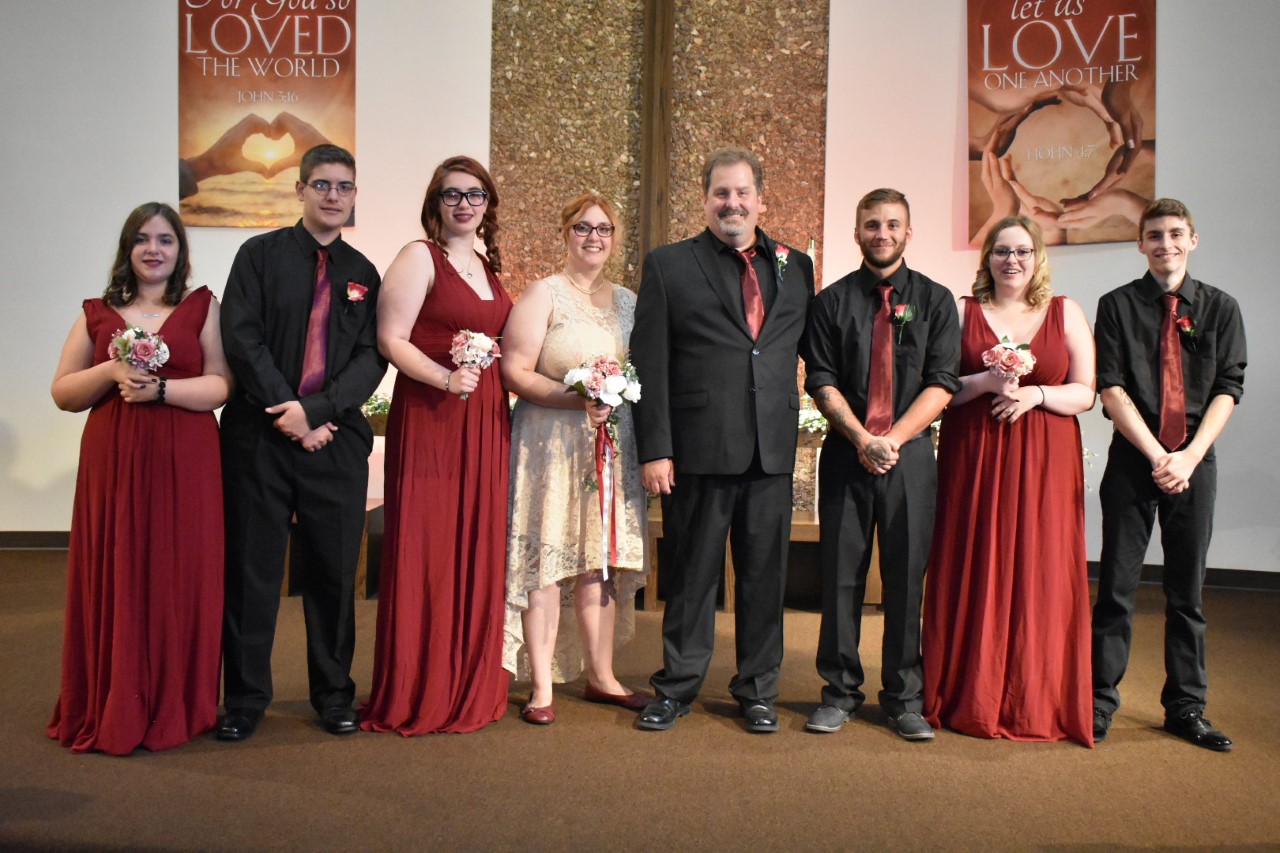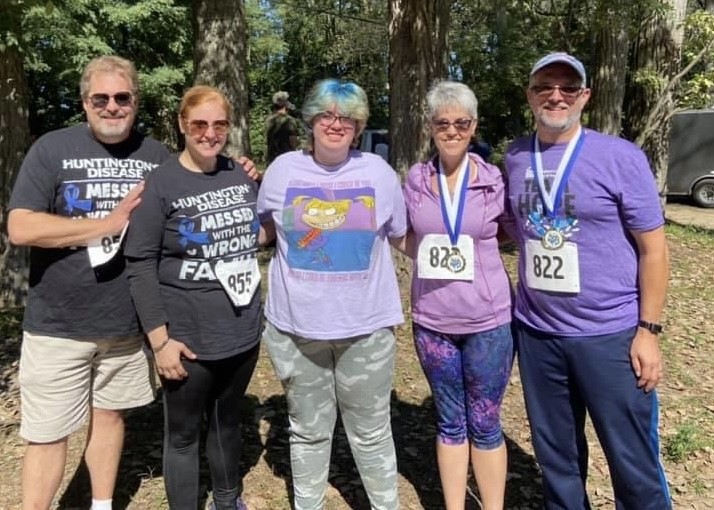
By Matthew Santamaria (msantamaria@hdsa.org)
For the majority of her life, Pennsylvania resident Theresa Gebhardt thought she had family members pass away to Parkinson’s disease. However, this was not the case.
"My father and his brother died young,” said Theresa. “My grandfather died at a young age and thought he had Parkinson’s disease, so because of the diagnosis of Parkinson’s disease, they didn’t know about Huntington’s disease back then.”
Huntington’s disease (HD) is a fatal genetic disorder that causes the progressive breakdown of nerve cells in the brain. It deteriorates a person’s physical and mental abilities during their prime working years and has no cure.

When she started dating her future second husband, she started to develop hand twitches, facial twitches, and they would worsen with stress.
The symptoms of HD are described as having ALS, Parkinson’s and Alzheimer’s – simultaneously. Symptoms include personality changes, mood swings, depression, forgetfulness, impaired judgment, unsteady gait, involuntary movements, slurred speech, difficulty in swallowing, and significant weight loss.
“In the last five years, I has many surgical procedures done as I was told over and over to hold still,” Theresa explains. “I went to my family doctor; he didn’t see a need to go see anyone else. One employer asked if I had anything I wanted to talk with her about, I didn’t know myself what was causing this.”
About four years ago, she was finally able to see a neurologist in Erie. The neurologist would diagnose Theresa with unspecified chorea, movements with no cause. Theresa would inform the neurologist about her family members with Parkinson’s disease.
“The neurologist pretty much said ‘oh well’,” said Theresa. “The brain MRI, and bloodwork were all normal. I was suggested medicine once and got mad because I asked what she was treating me for.”
Theresa would then be genetically tested for HD.
The decision to get genetically tested is difficult to make. Each year, 5-10% are tested. It is never the right or wrong decision to be tested. There are people that see no benefit in knowing that they will develop the disease while others want to know in order to make informed choices about their future. It can take up to several weeks to receive your results from the genetic testing center.
She tested positive for the gene that causes HD.
“I had convinced myself it wasn’t HD,” Theresa explains. “No one wants this diagnosis, I felt like it was a big huge slap in the face.”
This also meant that her three children were now at risk for HD. Every child of a parent with HD has a 50/50 chance of inheriting the faulty gene.
“My kids are the reason that I go on every day,” said Theresa.
Three months later, Theresa would go to the Cleveland Clinic, one of the 54 HDSA Centers of Excellence that provide an elite team approach to HD care and research. Professionals have extensive experience working with families affected by HD and work together to provide families the best HD care program.
“My whole family and work family and community as well,” Theresa explains. “This whole summer, my husband said no matter what this is we are in it together, we don’t give up. Every day I am still here on this earth I give thanks to God.”

Theresa encourages those affected with HD to live for today.
“No one is promised tomorrow, so do things you love, travel to the places you want to go, eat the food you love,” said Theresa. “Never ever take for granted that you have a purpose.”
###
Huntington’s disease (HD) is a fatal genetic disorder that causes the progressive breakdown of nerve cells in the brain. It deteriorates a person’s physical and mental abilities during their prime working years and has no cure. Every child of a parent with HD has a 50/50 chance of inheriting the faulty gene. Today, there are approximately 41,000 symptomatic Americans and more than 200,000 at-risk of inheriting the disease. The symptoms of HD are described as having ALS, Parkinson’s and Alzheimer’s – simultaneously.
The Huntington’s Disease Society of America is the premier nonprofit organization dedicated to improving the lives of everyone affected by HD. From community services and education to advocacy and research, HDSA is the world’s leader in providing help for today and hope for tomorrow for people with HD and their families.
HDSA was founded in 1967 by Marjorie Guthrie, the wife of legendary folk singer Woody Guthrie. Woody died from HD complications when he was only 55 years old, but the Guthrie family legacy lives on at HDSA to this day.
To learn more about Huntington’s disease and the work of the Huntington’s Disease Society of America, visit www.HDSA.org or call 1(800)345-HDSA.
This is a story featuring a personal experience with Huntington’s disease. If you would like to have your story told please contact Matthew Santamaria at msantamaria@hdsa.org
For the majority of her life, Pennsylvania resident Theresa Gebhardt thought she had family members pass away to Parkinson’s disease. However, this was not the case.
"My father and his brother died young,” said Theresa. “My grandfather died at a young age and thought he had Parkinson’s disease, so because of the diagnosis of Parkinson’s disease, they didn’t know about Huntington’s disease back then.”
Huntington’s disease (HD) is a fatal genetic disorder that causes the progressive breakdown of nerve cells in the brain. It deteriorates a person’s physical and mental abilities during their prime working years and has no cure.

When she started dating her future second husband, she started to develop hand twitches, facial twitches, and they would worsen with stress.
The symptoms of HD are described as having ALS, Parkinson’s and Alzheimer’s – simultaneously. Symptoms include personality changes, mood swings, depression, forgetfulness, impaired judgment, unsteady gait, involuntary movements, slurred speech, difficulty in swallowing, and significant weight loss.
“In the last five years, I has many surgical procedures done as I was told over and over to hold still,” Theresa explains. “I went to my family doctor; he didn’t see a need to go see anyone else. One employer asked if I had anything I wanted to talk with her about, I didn’t know myself what was causing this.”
About four years ago, she was finally able to see a neurologist in Erie. The neurologist would diagnose Theresa with unspecified chorea, movements with no cause. Theresa would inform the neurologist about her family members with Parkinson’s disease.
“The neurologist pretty much said ‘oh well’,” said Theresa. “The brain MRI, and bloodwork were all normal. I was suggested medicine once and got mad because I asked what she was treating me for.”
Theresa would then be genetically tested for HD.
The decision to get genetically tested is difficult to make. Each year, 5-10% are tested. It is never the right or wrong decision to be tested. There are people that see no benefit in knowing that they will develop the disease while others want to know in order to make informed choices about their future. It can take up to several weeks to receive your results from the genetic testing center.
She tested positive for the gene that causes HD.
“I had convinced myself it wasn’t HD,” Theresa explains. “No one wants this diagnosis, I felt like it was a big huge slap in the face.”
This also meant that her three children were now at risk for HD. Every child of a parent with HD has a 50/50 chance of inheriting the faulty gene.
“My kids are the reason that I go on every day,” said Theresa.
Three months later, Theresa would go to the Cleveland Clinic, one of the 54 HDSA Centers of Excellence that provide an elite team approach to HD care and research. Professionals have extensive experience working with families affected by HD and work together to provide families the best HD care program.
“My whole family and work family and community as well,” Theresa explains. “This whole summer, my husband said no matter what this is we are in it together, we don’t give up. Every day I am still here on this earth I give thanks to God.”

Theresa encourages those affected with HD to live for today.
“No one is promised tomorrow, so do things you love, travel to the places you want to go, eat the food you love,” said Theresa. “Never ever take for granted that you have a purpose.”
Theresa has a message for the HD Community:
“God is always in your corner, His shoulders are plenty big for all of your worries, and finally no matter what you're facing don’t ever lose hope, miracles happen every day. You are not alone, fellow warriors, we are all in this fight together.”
“God is always in your corner, His shoulders are plenty big for all of your worries, and finally no matter what you're facing don’t ever lose hope, miracles happen every day. You are not alone, fellow warriors, we are all in this fight together.”
###
Huntington’s disease (HD) is a fatal genetic disorder that causes the progressive breakdown of nerve cells in the brain. It deteriorates a person’s physical and mental abilities during their prime working years and has no cure. Every child of a parent with HD has a 50/50 chance of inheriting the faulty gene. Today, there are approximately 41,000 symptomatic Americans and more than 200,000 at-risk of inheriting the disease. The symptoms of HD are described as having ALS, Parkinson’s and Alzheimer’s – simultaneously.
The Huntington’s Disease Society of America is the premier nonprofit organization dedicated to improving the lives of everyone affected by HD. From community services and education to advocacy and research, HDSA is the world’s leader in providing help for today and hope for tomorrow for people with HD and their families.
HDSA was founded in 1967 by Marjorie Guthrie, the wife of legendary folk singer Woody Guthrie. Woody died from HD complications when he was only 55 years old, but the Guthrie family legacy lives on at HDSA to this day.
To learn more about Huntington’s disease and the work of the Huntington’s Disease Society of America, visit www.HDSA.org or call 1(800)345-HDSA.
This is a story featuring a personal experience with Huntington’s disease. If you would like to have your story told please contact Matthew Santamaria at msantamaria@hdsa.org
